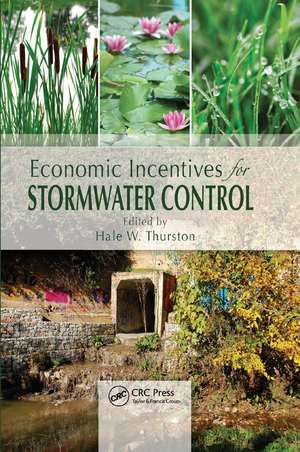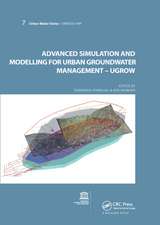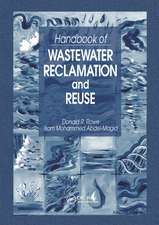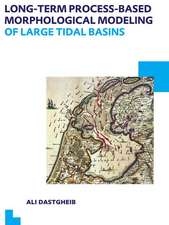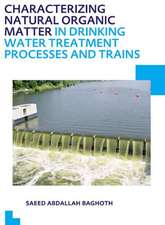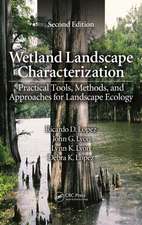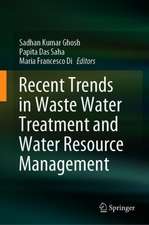Economic Incentives for Stormwater Control
Editat de Hale W. Thurstonen Limba Engleză Paperback – 10 dec 2019
Economic Incentives for Stormwater Control addresses the true costs and benefits of stormwater management practices (SMPs) and examines the incentives that can be used to encourage their adoption. Highlighting the economic aspects, this practical book offers case studies of the application of various stormwater runoff control policies. It also presents the theory behind the different mechanisms used and illustrates successes and potential obstacles to implementation.
The book covers:
- Efficient use of "green" SMPs
- Low-impact development (LID) style new construction
- Green infrastructure
- Property prices and incentive mechanisms to encourage homeowners to retain stormwater on their property
- Legal, economic, and hydrological issues associated with various incentive mechanisms
- In-lieu fees and cap-and-trade incentives
Primarily concerned with the sociodemographic and economic aspects of people’s participation in stormwater runoff control, this accessi
Preț: 484.74 lei
Nou
Puncte Express: 727
Preț estimativ în valută:
92.77€ • 96.49$ • 76.58£
92.77€ • 96.49$ • 76.58£
Carte tipărită la comandă
Livrare economică 15-29 aprilie
Preluare comenzi: 021 569.72.76
Specificații
ISBN-13: 9780367865764
ISBN-10: 0367865769
Pagini: 256
Dimensiuni: 152 x 229 x 25 mm
Greutate: 0.82 kg
Ediția:1
Editura: CRC Press
Colecția CRC Press
ISBN-10: 0367865769
Pagini: 256
Dimensiuni: 152 x 229 x 25 mm
Greutate: 0.82 kg
Ediția:1
Editura: CRC Press
Colecția CRC Press
Cuprins
Background and Introduction. Costs and Effectiveness of Stormwater Management Practices. Economic Costs, Benefits, and Achievability of Low-Impact Development-Based Stormwater Regulations. Accounting for Uncertainty in Determining Green Infrastructure Cost-Effectiveness. The Economics of Green Infrastructure and Low-Impact Development Practices. The Property-Price Effects of Abating Nutrient Pollutants in Urban Housing Markets. Opportunity Costs of Residential Best Management Practices for Stormwater Runoff Control. At the Intersection of Hydrology, Economics, and Law: Application of Market Mechanisms and Incentives to Reduce Stormwater Runoff. In-Lieu Fees: Steps Toward Stormwater Treatment Cost-Effectiveness. Cap-and-Trade for Stormwater Management. Index.
Notă biografică
Hale W. Thurston is an economist in the U.S. Environmental Protection Agency’s National Risk Management Research Laboratory in Cincinnati, Ohio. He received his PhD in Economics from the University of New Mexico, a Master’s in International Affairs from Ohio University, and a Bachelor’s degree in English Literature from Bates College. His research currently focuses on nonmarket valuation of natural resources in the policy arena and the use of market incentives to promote low-impact development. He has been especially active in a research study that looks at the use of rain gardens and rain barrels to reduce the impacts of stormwater runoff. Dr. Thurston worked on a reforestation campaign and a beekeeping project in the Peace Corps in the Dominican Republic. He currently resides in Cincinnati with his wife and two fantastic kids.
Descriere
Addressing a huge knowledge gap from a policy perspective, this volume focuses on the economic tools available for stormwater runoff control. It addresses the true costs and benefits of stormwater management practices and examines the incentives that can be used to encourage their adoption. The book provides case studies demonstrating the applic
